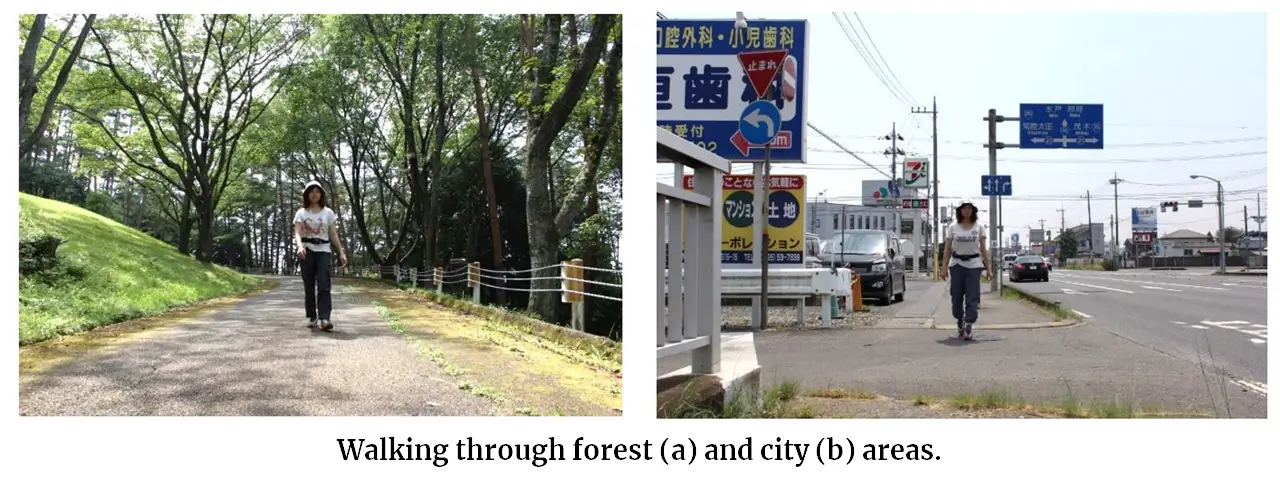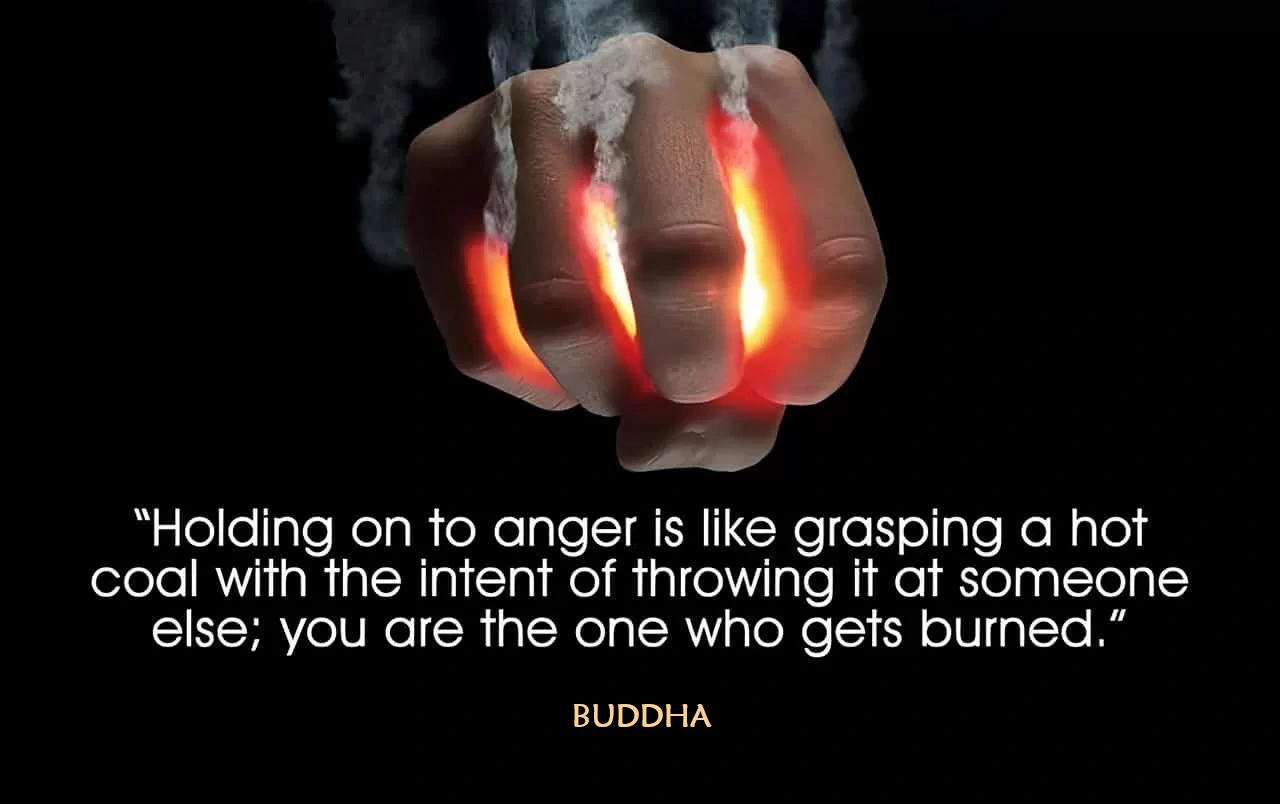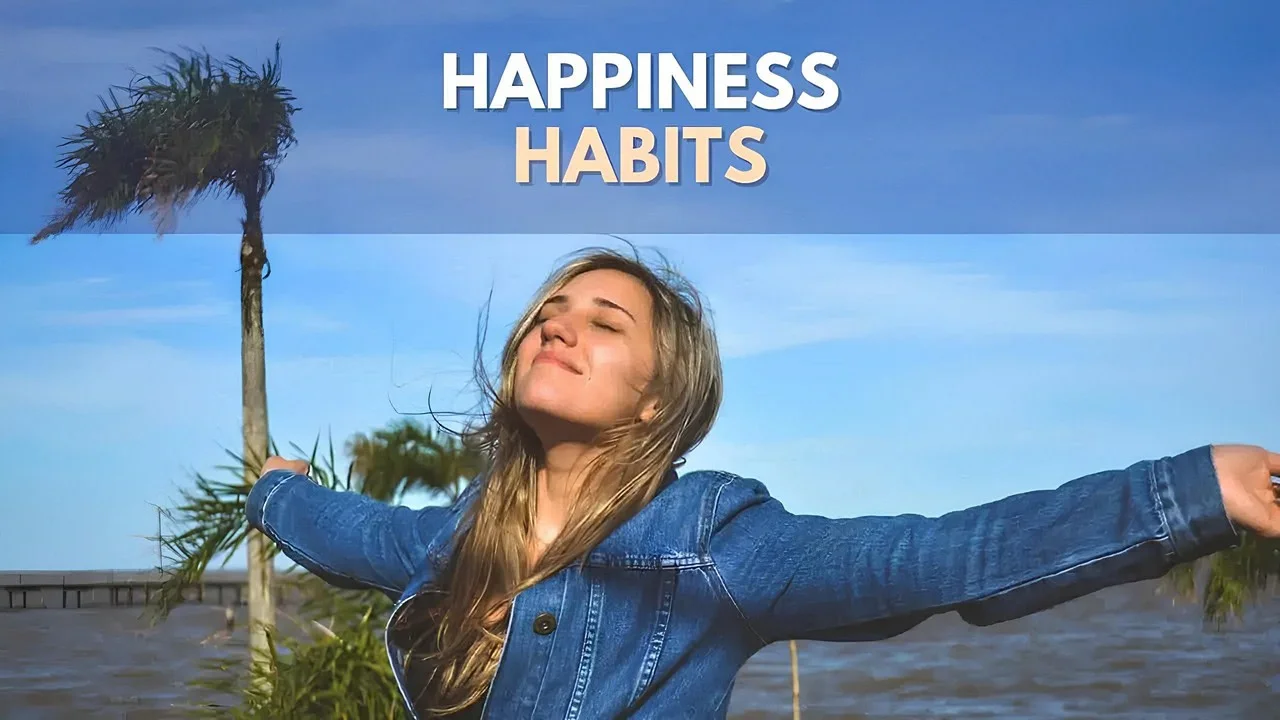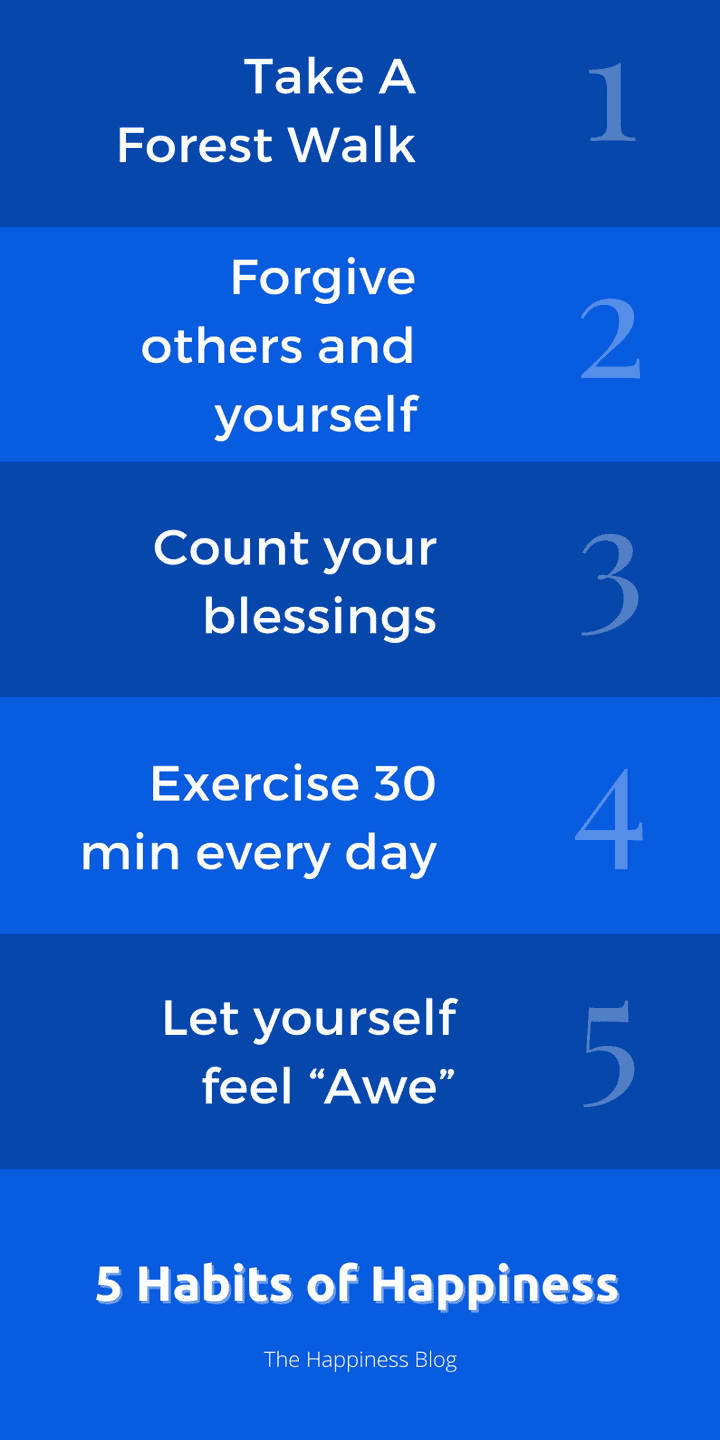Today's Tuesday • 10 mins read
— by Dr. Sandip Roy.
These ten habits will make you happier and more peaceful inside and out.
Positive psychologists have tested these habits (“interventions”) as effective in boosting our happiness, helping us cope better with stressful times, and making us more resistant to anxiety and depression.
In positive psychology, the technical term for happiness is subjective well-being (SWB).
10 Happiness Habits from Positive Psychology
1. A Walk In The Woods (Shinrin-Yoku).
Taking a walk in the forested area is a powerful way to boost your mood and health. Called shinrin-yoku, or forest bathing, in Japan, it has gained popularity in the West recently.
There is much scientific evidence to support its benefits. This study showed that shinrin-yoku can cause higher parasympathetic activity (more relaxation) and lower sympathetic activity (less stress).
Healthy young women who walked in a forested area (a) felt more comfortable and relaxed, and had better mood states and lower anxiety levels, than those who walked in a city area (b).

Another study found that exposure to nature is associated with improved brain function, blood pressure, mental health, physical activity, and sleep.
The benefits of shinrin-yoku are because of:
- The phytoncides (volatile organics) emitted by trees have anti-inflammatory properties.
- The negative ions found in forest air have been shown to improve mood and sleep.
Find a forested area (a place with many trees) and take a leisurely walk in the daytime, paying attention to the sights, sounds, and smells of the forest.
Tips for getting the most out of it:
- Take deep breaths and focus on the fresh air.
- Walk slowly and mindfully, paying attention to your surroundings.
- You may sit down or lie on the ground and close your eyes to listen to the sounds of the forest.
2. Forgive Your Offenders. And Yourself Too.
Everyone can be forgiven because forgiveness is for you, first and foremost.
There are two types of forgiveness:
- Decisional forgiveness: When you decide to change your behavior towards the person, but not your feelings. You do not let go of the anger or vengefulness. This forgiveness keeps your hurt alive.
- Emotional forgiveness: When you let go of the anger and resentment towards your offender, along with changing your behavior towards them. This forgiveness eases your mental pain. It can improve your well-being and reduce your risk of heart disease, stress, anxiety, and depression.
To forgive and forget is a well-known idiom. This study found the saying to be true only for emotional forgiveness, not decisional forgiveness.
Forgiveness can be difficult, especially for serious offenses. But forgiving doesn’t mean condoning their actions or denying your pain. You are releasing yourself from the burden of negative emotions.
Learn to forgive others, whether they deserve it or not. You don’t even have to tell them you forgave them.
And don’t forget to forgive yourself too.
Buddha said, holding on to anger is like grasping a hot coal with the intent of throwing it at someone else; you are the one who gets burned.

3. Start The “3 Good Things” Practice
The Three Good Things (TGT) is writing three good things that happened in your day.
TGT teaches you to focus more on the positive and less on the negative things in your day. It trains your brain to be more optimistic and see possibilities when there are obstacles.
Research shows TGT practice can boost happiness levels (Seligman & Steen, 2005).
Some tips to get better at Three Good Things (TGT):
- Be specific. Don’t just write, “I had a good day.” Instead, something like “I was appreciated at work” or “I had a hearty talk with a good friend.”
- Focus on the positive. Even if you had a tough day, there may have been a few good things. Maybe you saw a beautiful person, solved a crossword, or had a great-tasting coffee.
- Be grateful. Take a moment to appreciate the good things you wrote. Relive those moments and think about how blessed you are to have experienced them.
The Shortest Guide to The 3 Good Things.
4. Exercise At Least 5 Days A Week
It may come as a surprise that exercise can boost your mood and happiness, whatever your age, gender, or physical condition.
Physical activity releases endorphins, which have mood-boosting effects. John Ratey, the world-famous exercise researcher, says:
“Exercise generates the release of serotonin, norepinephrine, and dopamine in the brain. People’s mood significantly increased after exercise.”
Aim for at least 30 minutes of moderate-intensity exercise for 5 days of the week. Even short bursts of activity can make a difference. Take a brisk walk, do some bodyweight exercises, or play a sport.
Some happiness benefits of exercise:
- Exercise distracts you from negative thoughts and worries.
- It increases social connectedness when you exercise with others.
- It helps you have better control of your body, which then boosts your mood.
- Exercise helps reduce stress, improve sleep quality, and increase self-confidence.

5. Have More Experiences of Awe
Awe is a difficult sensation to describe. Think of awe as mild fear mixed with wide-eyed wonder.
It could be what you feel when you actually look at a giant art installation like the steel cloud at Grainger Plaza, Chicago.

You get a sense of awe when you come across something that’s exceptionally vast and incredibly powerful.
Awe can exhilarate us while also making us feel a little weak in the knees. So, in a way, awe is a little less joyful than pure wonder. In any case, it is light-years away from the irritatingly ubiquitous urban jargon ‘awesome.’
Awe is a combination of fear, admiration, delight, and surprise.
To let yourself feel “The Little-Known Power of Awe,” look at some old pictures from your past, watch a flower sway in the spring breeze, or peer into the vast expanse of a late evening sky.
Psychologists Paul Piff, Pia Dietze, and Dacher Keltner tell us how to find awe in their paper Awe, the Small Self, and Prosocial Behavior:
Awe arises in evanescent experiences. Looking up at the starry expanse of the night sky. Gazing out across the blue vastness of the ocean. Feeling amazed at the birth and development of a child.
Paul Pearsall, clinical neuropsychologist, wrote the first-ever book on awe: Awe: The Delights and Dangers of Our Eleventh Emotion. It was also his last book.
Pearsall saw awe as the 11th emotion, beyond the scientifically accepted ten emotions of love, fear, sadness, pride, embarrassment, curiosity, enjoyment, despair, guilt, and anger. He wrote:
If we … put in the effort to try to understand a little more about life’s meaning, awe becomes less a feeling of being high and more a feeling of deep immersion in any and all of life’s processes.
Felix Baumgartner jumped from a helium balloon floating 39 km (~24 miles) above the Earth to set a world record for the highest skydive – watch it on YouTube and feel awe.

6. Sleep Well, Sleep Full.
According to the National Sleep Foundation, Mayo Clinic, and CDC, the recommended amount of sleep for adults is 7–9 hours per night regularly for optimal health.
Now, what research tells us is that proper sleep can have a major impact on our life-satisfaction and well-being.
- Studies have shown that people who get adequate quality sleep are more likely to rate their lives as happier and more satisfied. Good sleep quality can also drastically increase happiness and should be promoted as a public health value.
- On the other hand, poor or inadequate sleep can cause irritability, stress, and negative emotions such as anger, sadness, and mental exhaustion, which can lead to emotional disorders, depression, and anxiety.
Better sleep also improves memory and creativity, reduces inflammation and stress, and boosts brain functioning.
Want to know how to improve your sleep habits? Here’s our well-researched post on sleep science hacks here: Six Scientific Sleep Hacks.

7. Meditate Ritually
Meditation is the key to peace of mind.
Meditation has been practiced for eons in hundreds of forms. It can help you cope with stress, improve memory and brainpower, and increase attention and peace.
Make meditation a daily ritual for increased happiness. Try this beginner-level guide: Mindfulness In 7 Steps.
8. Laugh More Often
A person who can’t laugh at himself, can’t make others laugh.
Look for ways to laugh more. There are several health benefits of laughing:
- Laughing releases endorphins—your body’s feel-good chemicals
- Laughing helps in the better oxygenation of the blood
- Good for skin health and reduces dark circles
- Laughter enhances the healing process
- A smiling face looks more attractive
- Brings a positive state of mind
- It reduces stress hormones
A few ways to get more laughter:
- Make friends with someone who has a good sense of humor
- Watch comedy shows and laughter gags
- Follow funny people on social media
- Spend some time with kids
- Spend time with pets
- Play fun games
9. Accept Yourself And Love Yourself
A lot of our stress comes from not fully accepting ourselves.
Self-acceptance opens doors, not closes them.
It is not saying, “This is who I am, take it or leave it,” meaning you won’t change.
Rather, it is becoming aware of your positives and negatives, so you may change for the better.
When you accept who you are, you also become more self-assured and adaptable, knowing which values to hold onto and which to let go of.
Acceptance and Commitment Therapy can help us overcome our feelings of unacceptance, self-criticism, and regret.
10. Embrace Change & Stay Optimistic
Change is the universal rule of nature. Of course, embracing change comes with fear and uncertainty.
But you don’t have to know the whole path where change will take you. You just need to take one step at a time to balance out the fear and uncertainty.
- Accept what is, and move on.
- Start facing your fears head-on.
- Let your overall tone of life be one of optimism.
- Don’t waste time blaming anyone—yourself, other people, or circumstances.
Father of Modern Positive Psychology, Martin Seligman, lays out three strategies to override your inner pessimist:
- Accept setbacks mindfully,
- Challenge your negative thought patterns,
- Try to find out alternate explanations for seemingly bad events.
7 Simple Habits To Be Happy Every Day
- Take some time to do nothing. A few times a day, stop what you’re doing and spend those seconds doing nothing but simply being.
- Make time for friends and family. Talk to a friend, even if it’s just for a minute. Spend some quality time with your loved ones.
- Do something you love every day. Whether it’s gazing up at the sky, soaking in the morning sun, walking your dog, or reading a page from a good book.
- Make a to-do list every morning or the night before. It takes off some stress.
- Do something nice for someone else, whether small or big.
- Be thankful for the good things. Speak some words of gratitude for what you have, even if you have little. Do this before going to bed.
- Say “no” to some things and people to free up time to work on yourself.
Final Words
- A habit is an act you do without paying much attention.
- A ritual is just the opposite; it needs intentional focus.
So, start with a happiness ritual, and keep at it patiently so that it turns into a happiness habit.
“Happiness is a state of being, not a place to arrive at.” — Robert Holden, PhD
• • •
√ Also Read: 10 Greatest Happiness Hacks From Positive Psychology
√ Please share this if you found it helpful.
» You deserve happiness! Choosing therapy could be your best decision.
...
• Disclosure: Buying via our links earns us a small commission.